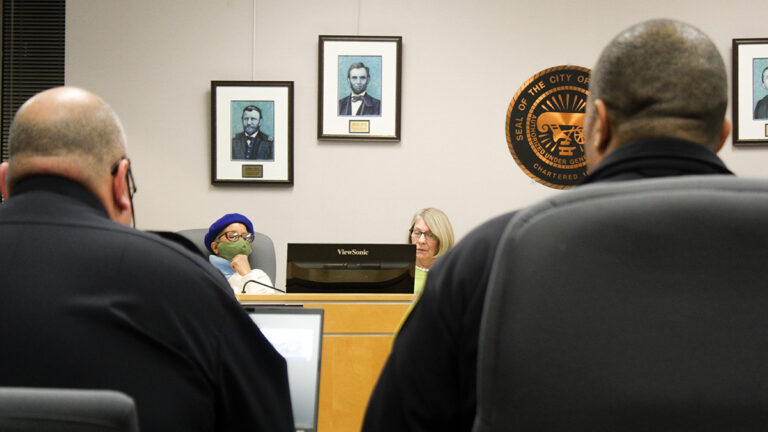The Urbana City Council moved to approve its budget for the next fiscal year at a council meeting Tuesday. The Urbana Police Department had asked the Council to fund 11 positions. But after months of pressure from community members to divert funds away from police to groups that provide social services, the Council voted to only fund two positions: a deputy chief and a training sergeant.
At next week’s meeting on June 24, council members plan to decide on whether to add community engagement officers and provide funding for a community engagement office in Southeast Urbana.
At Tuesday’s meeting, which was a continuation of a meeting that began Monday night, city officials pledged to create a task force of community members to help decide what the future of policing will look like in Urbana.
“We need to make sure that our community members actually have a voice in what public safety means to them,” Urbana City Council member Jaya Kollisetty said. “I don’t think where we are is representative of what we’re hearing from our community, and I think that’s disappointing for a city that says that our residents are at the top of the organizational chart.”
Recently, local activists have gathered hundreds of signatures on a petition advocating for using city money to fund social services and alternative responders instead of more police staff and resources. At the City Council meeting on Monday, dozens of people expressed support for this shift in resources.
The Council’s decision to not fund many of UPD’s requested positions also comes while BerryDunn, a national consulting firm, is in the midst of releasing its studies of the Urbana Police Department. The consultant was hired to evaluate how the department works, including how — and if — officers should handle certain types of calls for service.
In December 2023, Urbana Police Chief Larry Boone asked the Urbana City Council to amend the budget to hire four additional police officers. The Council deferred the decision until BerryDunn released the staffing report.
BerryDunn later released its report on staffing, which recommended hiring 13 officers.
Boone’s request was part of his larger plan to hire 15 additional officers — just two officers more than the number recommended by BerryDunn. More recently, Chief Boone amended his proposal to ask for 11 staff positions instead, including funding a community engagement team comprised of three police officers operating out of a leased space in the Philo Road area of Southeast Urbana.
According to the proposed budget, this team would be a pilot effort for three years — costing over $1.2 million.
Urbana City Council member Grace Wilken, who represents Ward 6, brought up concerns over funding a community engagement team for the police when there are already community organizations doing community engagement work.
Boone addressed her concerns during Tuesday’s meeting, saying that he believes everyone in the community should work together towards a shared goal.
“I recognize that police are there to have a partnership with those services that are already providing services,” Boone said. “But what I’ve learned is through the lens of law enforcement and the lens of nonprofit, particularly in locations of poverty, [that] as a force multiplier, outcomes are better.”
Danielle Chynoweth, the supervisor of Cunningham Township, said the city should not hire more police when the report shows that most calls to UPD are non-criminal. She argues the funding needs to be spent investing in alternative groups that could respond to calls the police don’t need to be at.
“What I’m hearing is that we should spend $1.5 to $2 million on more police personnel, and hope that community groups pick up the slack with the alternative responder model,” Chynoweth said in response to Boone’s proposal to hire 15 more officers. “That is not an appropriate use of public dollars.”
Many Urbana residents told IPM News in previous interviews that more investment in social services and economic development would eliminate the need for more police staff.
“If you have institutions that create jobs, that create value for the neighborhood, that give you things that you actually need, then there’ll be less necessity for any police to exist,” said Gus Wood, president of the Urbana-Champaign Independent Media Center.
Urbana resident Alexandria Stone, who spoke at Monday’s meeting, argued that funding programs and organizations that target root causes of crime, including poverty, would eliminate the need for more police.
“People do not commit crimes because they want to,” Stone said. “People resort to criminal activity out of desperation. If we prioritize the well-being of our community, most of the crime will sort itself out.”

